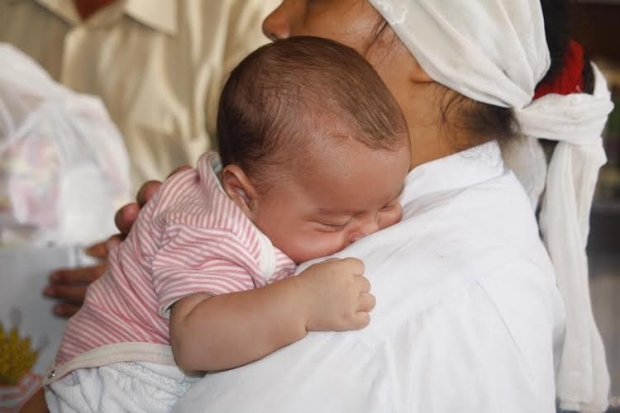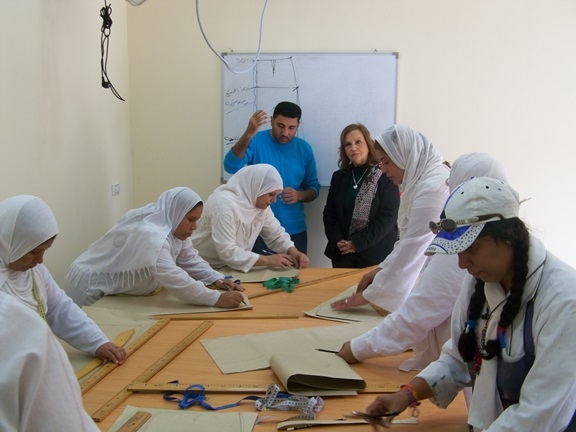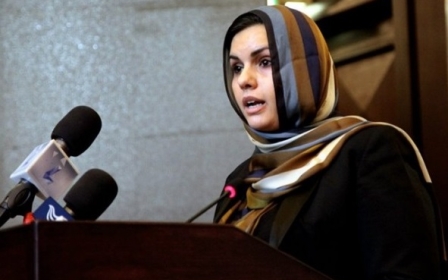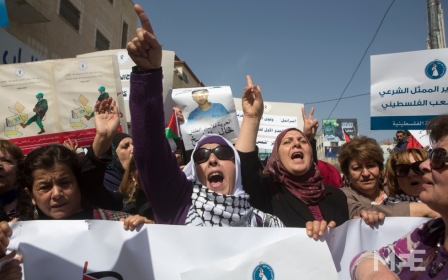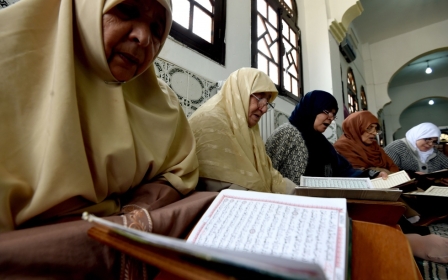Fighting the system from the inside

In 1990, young journalist Nawal Mostafa was on the trail of a juicy story. Five years into her career and seeing her chance for a scoop, she visited one of Cairo’s most notorious female prisons to interview four drug smugglers on death row. But what stuck with the Egyptian woman were the young innocent faces playing in the prison’s playground.
“The scene stopped me with great surprise, and I had to ask the commanding officer of the prison: ‘Who are these children? What are they doing here?’” Mostafa recalls.
These days, the mother of three wears many different hats. As well as being a journalist and a novelist, she used to be an editor-in-chief at one of the biggest newspapers in Egypt, Akhbar El Yom.
“It was a shock when I heard [the commanding officer’s] answer: ‘They are living here with their imprisoned mothers’. This ugly fact captured me and I began thinking obsessively about them. That was the beginning of a long journey with female prisoners and their children.”
Mostafa still works for the paper but stepped back from her editing role two years ago to focus on the NGO she founded in 1990, Children of Female Prisoners’ Association (CFPA).
She works long and exhausting hours trying to juggle commitments. While she says the work took her “without mercy” from journalism, it is this work that most touches her heart.
That prison visit 25 years ago has led Mostafa on a long and often heart-wrenching plight in a campaign to improve the lot of the women she calls “poverty prisoners” and their children.
“[Egyptian jails are] a huge theatre of human tales and paradoxes of fate. The stories of the imprisoned women in this place occupied my thoughts and the faces of the children living in a place that crushes every sense of innocence besieged me.”
In the western world, debtors’ jails are a horrific Dickensian relic of the past. But in Egypt, citizens can be locked away for accruing debts as trifling as $70.
One such woman, who did not want to be named, was put in jail for six months and her husband for seven years after taking on debt to pay for a $2,600 surgery to save their son from going blind. The woman's husband had no fixed job and the pair have five children in a spartan house in Giza.
After her husband was jailed, the person who loaned the money took the women to court. She says CFPA helped reduce some of the debt and therefore the jail time.
"Inside prison, they bring all the required food materials and covers for the beds and clothes for the prisoners and their kids and opened a new workshop for teaching sewing."
Leaving her children behind was the hardest part, she says, now out of jail.
"From the first moment I was inside jail far from my children, I didn't feel any taste for life. I saw my children every night in my dreams and imagined talking with them."
Now she hopes for a future where her husband is out of prison and has a job, and they can afford furniture for their bare home.
"I imagine the future without debt will be a brilliant future."
Mostafa estimates that, at any one time, between a quarter and a third of women in Egypt’s prison system, which has been described by human rights organisations as rife with torture, are languishing there as a result of outstanding debts – most totalling not more than $1,000.
“Jail terms might reach to 30 to 35 years because each debt has a separate judgment. It’s very illogical, it needs changing in the law.”
But what might seem more shocking to some is that many of these women actively choose to bring their young children behind bars with them in accordance with Egyptian law.
“They have the decision, but prison administration permits them to keep their babies until they reach two years old. This is because of breastfeeding, and also it’s kind of a mercy for both mother and child.”
Some of the women give birth whilst imprisoned. Mostafa estimates the population of child prisoners who are locked up alongside their mothers in Egypt’s eight female prisons numbers several hundred.
This may be viewed as a grotesque or selfish choice. What does Mostafa think about the decision?
“It’s not selfish but it’s a need. These very young creatures are in need of looking after … despite being in this very miserable place, being with their mothers is very important for young babies.”
It is a harsh reality that often these youngsters have nowhere else to go. Family often refuse them and when they reach two years of age; many end up in one of Egypt’s sometimes-unsavoury 450 orphanages.
Saying goodbye can be incredibly rough.
“It’s very sad – I’m crying many times in that moment myself. It’s very miserable when their children are taken from their arms and go out of prison. Many of them are facing very sad moments and nights after their babies go.”
One of the saddest facts of life inside all Egyptian prisons is that inmates are not given adequate provisions because of the strain on the country’s ailing economy and federal budget.
“The prisons provide the inmates with some food but it’s not enough for them and their children, so we try through CFPA to co-operate in that matter by going in a monthly visit [to] provide the mothers with basic needs of food, milk, medicine, clothes for the children, blankets [and so on].”
One of CFPA’s major triumphs has been to secure the release of more than 100 women from prison, after raising enough funds to repay their debts and completing the arcane legal paperwork necessary for the court system.
“It’s a very complicated journey but we make it with faith. We were the first organisation to raise public awareness about this [tragic] cause.”
Mostafa says the other main aims of CFPA are to remove the stigma of former female prisoners and their children, continue to provide care for children of these women once outside prison, but also train the women whilst they are inside prison in order to empower them economically and help break the crushing cycle of poverty.
Mostafa has implemented small projects inside prison through a new campaign, New Life, which she started several years ago.
“We have established a small [initiative] inside Qanater prison, the biggest prison for females. We provide this incubator with sewing machines and materials and professional trainers. We teach them the profession of sewing and other handcrafts.”
Mostafa is also planning to open a small factory in Cairo where the trained women can go to work after their release next year. CFPA needs to raise enough funds to purchase the necessary machinery and pay for building rent – or hope that someone donates such things. In the meantime, she is running an economic project for released women to work from home with provided sewing machines and materials.
“This project aims also to integrate these women into the society by removing the stigma of being prisoners and rehabilitate them psychologically, so they can show society they are good citizens.”
Ex-prisoners are treated with suspicion and find it exceedingly difficult to find paid work or qualify for bank loans.
The thousands of imprisoned women are in many ways a victim of circumstance – Mostafa says the women accrue debts by purchasing what are generally household items on credit. They wind up facing criminal charges when they cannot make payments to irresponsible or predatory lenders.
“There is a very remarkable change in their feeling toward themselves, their self-esteem is a lot higher when they get this training and also we give them psychological training at the same time ... the results are great, more than I expected in the beginning.”
In recognition of her work, Mostafa has been made an Ashoka Changemaker fellow, meaning the social entrepreneurship organisation gives her logistical and financial support.
Ashoka Arab world fellowship assistant Aya Sabry says Mostafa’s work is crucial in stopping the loan-based dependency of poverty prisoners.
“Most of the women when they’re finished their prison period they get out and they continue the loan circle."
“Nawal breaks this cycle and makes society involve the women again by enabling them to generate revenue to survive and for their children. Nawal’s work is important for society as there are a big number of women prisoners in Egypt with small, small loans.”
Poverty can be a life-sentence in itself in a country where the infrastructure does not exist to help people lift themselves out of prison. And the troubles facing the country have only multiplied in the years since a rush of enthusiasm and self-empowerment led to the overthrow of Hosni Mubarak and the subsequent chaotic foray into democracy.
“Egypt has been going through hard times during the years since the revolution of January 25, 2011. Poor people in general are affected a lot by the political and economic crisis and for sure this group of women were part of that.”
The long-inactive parliament has complicated any progress Mostafa has made advocating for policy changes, as there has been no chance to enact new regulations that will mean these women are seen differently in the eyes of the law.
But Mostafa says she will not stop fighting for this reality – and she has a novel answer to eliminate debts without the need for incarceration.
“I dream of changing the law to make it stop considering these poor ladies who can't pay back their small debts as criminals, and to stop putting them in prison by reaching a compromise in which the government pay the debts for them and let these women work in the public service – instead of being punished as criminals.”
It makes no sense to criminalise poverty and send victims to overcrowded prisons where they become a burden rather than an asset to society, she says.
And things may be swinging in her favour, politically speaking. The country’s newest president may be the former right-hand man of previous dictator Hosni Mubarak, but Abdel Fattah al-Sisi seems to be more aware of the need to respond to the public than his predecessor.
Mostafa says he has already led an initiative to release all female poverty prisoners, something he kicked off by setting free 41 female poverty prisoners from Minya prison in February.
“He strongly backs this group of poor women.”
Mostafa has seen a lot of changes in Egyptian society over the past two and a half decades. But she says she won’t stop fighting until she wins real change.
“When I met these people in the prison, 20 years ago it was a defining moment for me, and I couldn't stop thinking about their tragedy. I felt a responsibility towards them and this feeling has become part of my fate.”
New MEE newsletter: Jerusalem Dispatch
Sign up to get the latest insights and analysis on Israel-Palestine, alongside Turkey Unpacked and other MEE newsletters
Middle East Eye delivers independent and unrivalled coverage and analysis of the Middle East, North Africa and beyond. To learn more about republishing this content and the associated fees, please fill out this form. More about MEE can be found here.


